September 14, 2025 – European Lecture Tour (7) Istanbul
Hello. Today marks the seventh lecture of Venerable Pomnyun Sunim’s European tour, taking place in Istanbul, Turkey’s largest city.
The flight that departed Milan at 7:25 PM last night arrived at Istanbul Airport at 2:20 AM local time after a stopover in Athens. Sunim caught some sleep on the plane.
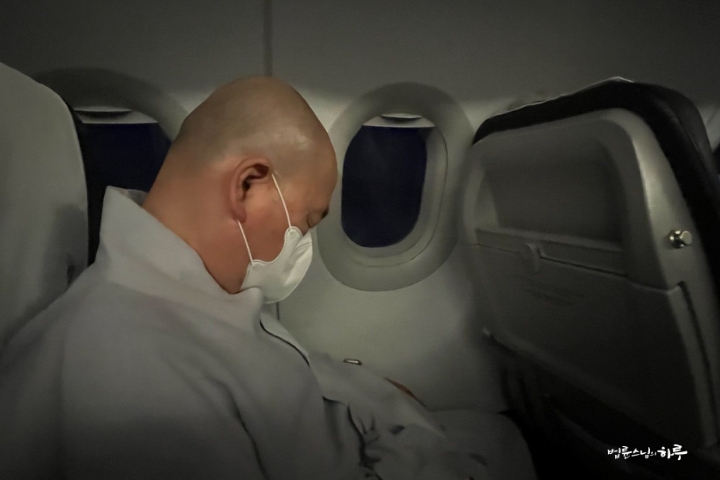
Upon exiting the airport, Mr. Kim Jung-ho, president of the Korean Association, warmly welcomed Sunim. The association president drove them to their accommodation, where they arrived at 4 AM, unpacked, and rested.
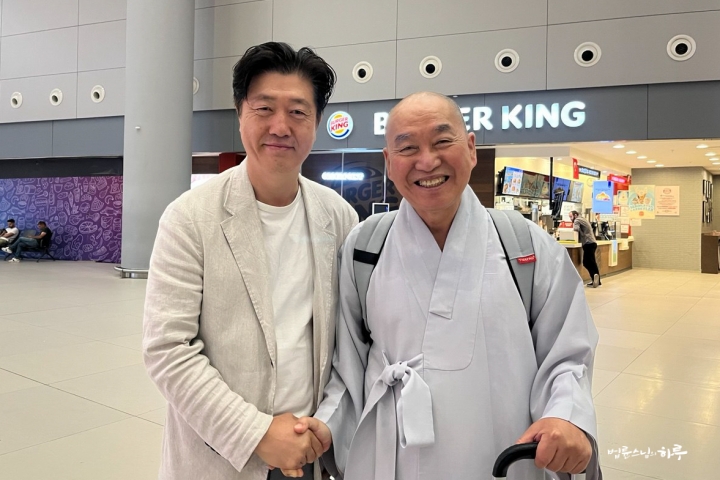
After getting sufficient rest and recovering from fatigue, Sunim participated online in the Jungto Society Lead Volunteers Assembly starting at 10 AM. This gathering brought all leading members together in an online space to share and propose ideas for Jungto Society’s overall operations. This was the sixth Lead Volunteers Assembly held since the beginning of the second 10,000-Day Practice.
Leading members in Korea had been sharing business reports and plans since 9 AM, engaging in passionate discussions throughout the day until 4 PM. When Sunim entered the video conference room, the leading members asked questions about doubts and curiosities that arose during their day-long discussions. After an hour of Q&A, they requested closing remarks from Sunim with three prostrations. Sunim shared updates about the growing turmoil in various parts of the world and discussed the mindset that leading members should maintain in their activities.
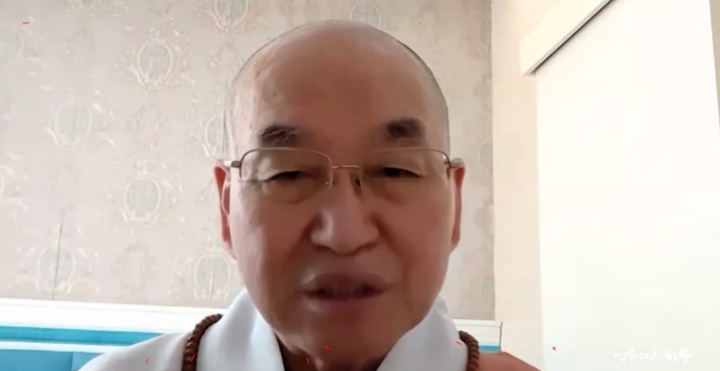
“In recent days, unexpected incidents have been occurring in succession across various countries. In the United States, more than 300 of our citizens were arrested and detained. In Nepal, the frustration of Gen Z youth exploded into riots, resulting in dozens of deaths. As angry young people continued setting fires, the country essentially fell into anarchy. The day I arrived in the UK, a subway strike meant it took three hours to get from the airport to the lecture venue. When I arrived in France, protesters were setting fires and a railway strike nearly prevented us from taking the train.
Continuing Chaos Around the World: Why Does Peace Seem Further Away?
I’m now in Istanbul, where the situation is extremely unstable after the Supreme Court ordered the dissolution of an opposition party. Today’s lecture could have been canceled, but fortunately, the lecture for Korean residents seems to be proceeding as scheduled. Recently in Indonesia, riots and protests led to the cancellation of both local and Korean resident lectures. The world is currently in a very unstable state.
Looking at the bigger picture, the hegemonic competition between the US and China is becoming increasingly fierce. The strengthening cooperation among China, Russia, and North Korea is also evident. Israel is acting like a tyrant, ignoring international rules by bombing not only neighboring Syria and Iran but now even Qatar. Horrific massacres are taking place in Gaza, yet the international community is essentially standing by.
In the United States, a young person opposed to far-right activities committed an assassination. Additionally, a 30-something candidate running for New York City mayor is gaining 46 percent support with leftist populist promises like ‘rent freeze’ and ‘free subway rides.’ President Trump is now trying to unite the opposition across Republican, Democratic, and independent lines to stop this. In Europe, far-right parties opposing immigration are gaining the top position in various countries and expanding their influence. As seen in Nepal’s case, we can confirm that discontent is building up around the world due to widening wealth gaps, ready to explode at any moment.
Why We Must Create Good Connections Even When the World Doesn’t Recognize It
All of this shows that despite our efforts for peace, we’re actually moving in the opposite direction rather than toward peace. However, this doesn’t mean we should give up thinking ‘it’s useless.’ Rather, in these times of chaos, we must work even harder to respect human rights, preserve peace, help those in need, reduce wealth inequality, and prevent the climate crisis. Of course, even if we do our best, our achievements might be buried under the world’s massive currents and go unnoticed. Sometimes we might even be criticized for ‘doing useless things.’ But if we broaden our perspective to 50 or 100 years ahead, the world will ultimately have to move in the direction we’re walking. Otherwise, mutual destruction is inevitable. Our efforts may not shine right now, but they might bear fruit in the distant future.
The Buddha’s teachings are the same. While Buddhism has spread throughout the world today, it didn’t dominate all of Indian society from the Buddha’s time. Back then, the Buddha was just one among many teachers, and there were many practice groups and religious organizations much larger than Buddhism. However, teachings that pursue truth could only shine after a storm had passed. When storms rage, populist claims that ride those storms appear to grow faster and seem more successful. That’s why we must be like trees deeply rooted in the earth, firm in our faith, clear about our direction, and unwavering. While many people benefit from and are grateful for Dharma Q&A, Jungto Dharma School, and Happiness School, behind these are the efforts of those who serve quietly in unseen places.
Human nature tends to want great recognition for doing even a little good, while wanting to hide bad deeds even after doing much wrong. This creates imbalance. We must look far ahead and steadily continue doing good work. Whether the world recognizes it or not, creating connections will surely bring results. We must steadily move forward, step by step, on the path of creating good connections to accumulate future blessings and avoiding bad connections to prevent disasters.
If you feel somewhat exhausted, it might be because your direction isn’t clear, your goals exceed your abilities, or you lack the wisdom to manage things properly. For example, if a meeting that should take 30 minutes drags on for an hour due to poor preparation, it becomes inefficient, uninteresting, and only accumulates fatigue. Such aspects need to be corrected. Many suggestions came up in today’s Lead Volunteers Assembly, and we should accept those proposals to operate Jungto Society more efficiently. Also, no matter how good the work, we shouldn’t be overly ambitious. We’re not people who will work for three years and quit; we’re people who must walk together for a long time. To protect the health and faith of members who drive our work forward, we must continue providing practice, education, and training so they can maintain their strength. While it’s important how much we spread the dharma externally, it’s equally important how well we care for the people doing that work.
From that perspective, I hope the Standing 1000-Day Preparatory Committee will properly accept the suggestions you made today. I hope they use them as a foundation to improve what needs improving, supplement what needs supplementing, and correct what needs correcting.”
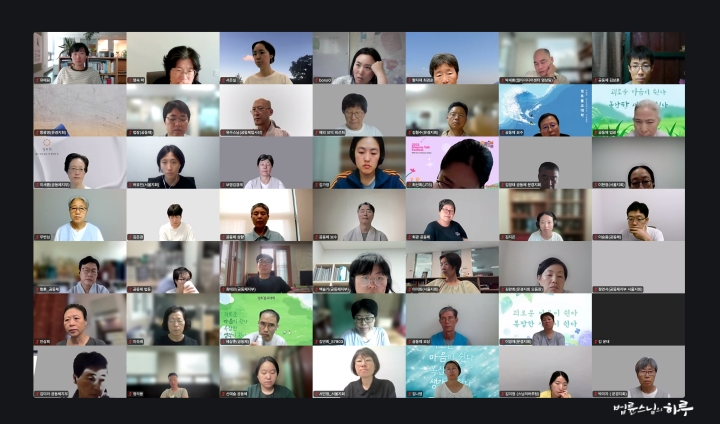
After reflecting on Sunim’s Dharma talk and reciting the Four Great Vows, the Lead Volunteer Assembly came to a close.
After finishing the live broadcast, Sunim had lunch at his accommodation. Following lunch, he departed for the lecture venue at 3 PM. Although the distance from the accommodation to the venue was only 15 kilometers, it took an hour and a half due to heavy traffic.
Today’s lecture was held at the Turkish Korean Community Center, located on the Bosphorus coast in the Sarıyer district of Istanbul. This center was established as a place where Koreans living in Istanbul and throughout Turkey can gather, exchange ideas, promote Korean culture, and hold various events. Today, Venerable Pomnyun Sunim’s Dharma Q&A was held here.
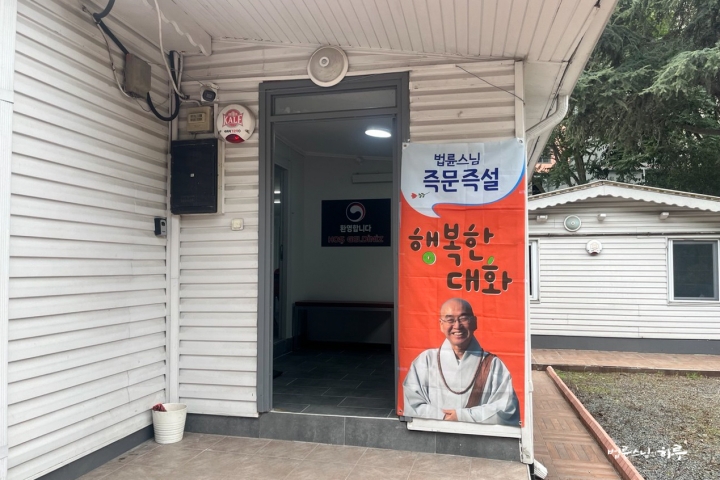
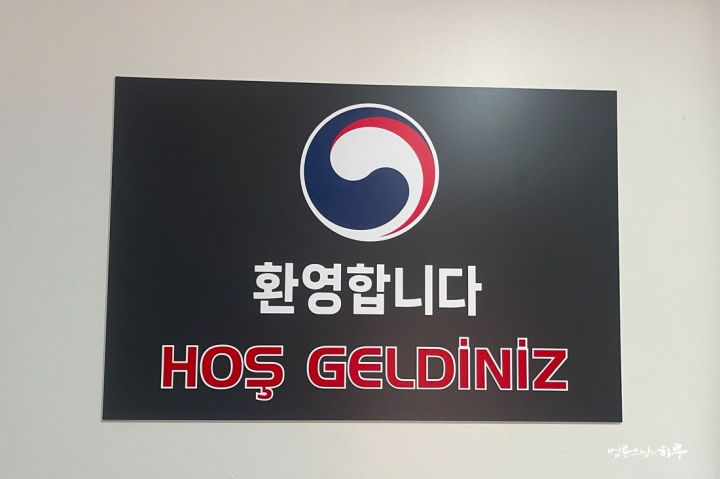
When Sunim entered the lecture hall, volunteers warmly welcomed him.
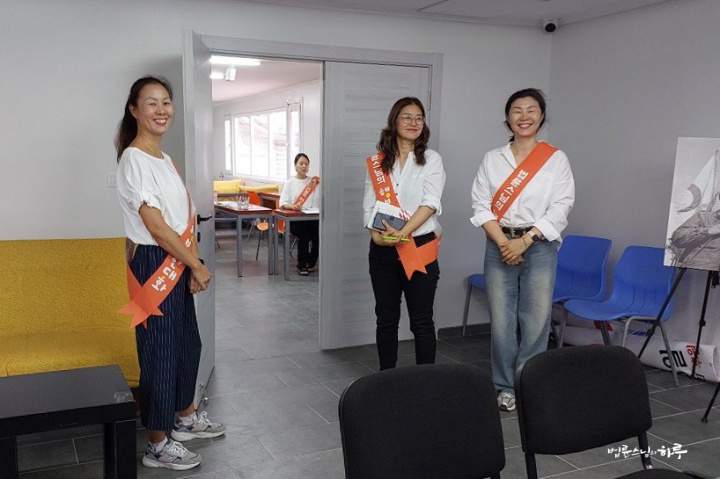
Upon arriving at the venue, Sunim had tea with Mr. Kim Young-hoon, the former president of the Korean Association. Mr. Kim helped arrange the lecture in Istanbul and also served as Sunim’s driver during his stay in Istanbul.
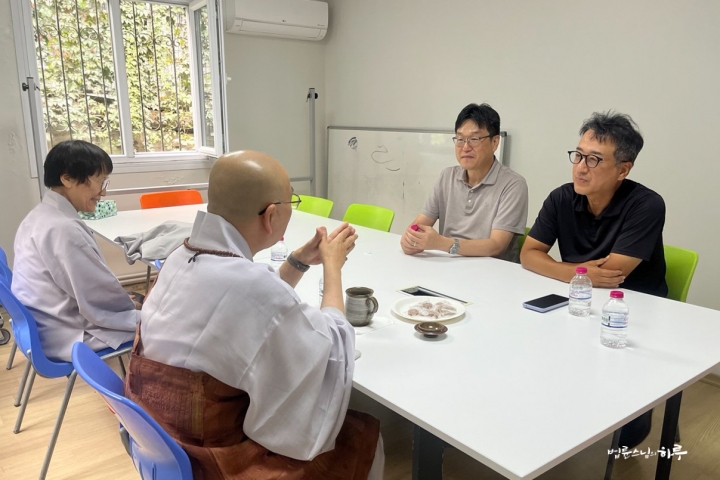
At 5 PM, with 35 Korean expatriates gathered, a video introducing Sunim was screened. Perhaps due to rumors that the lecture might be canceled, many who had registered in advance did not attend. When the video ended, loud applause erupted, and Sunim walked onto the stage to the sound of applause.
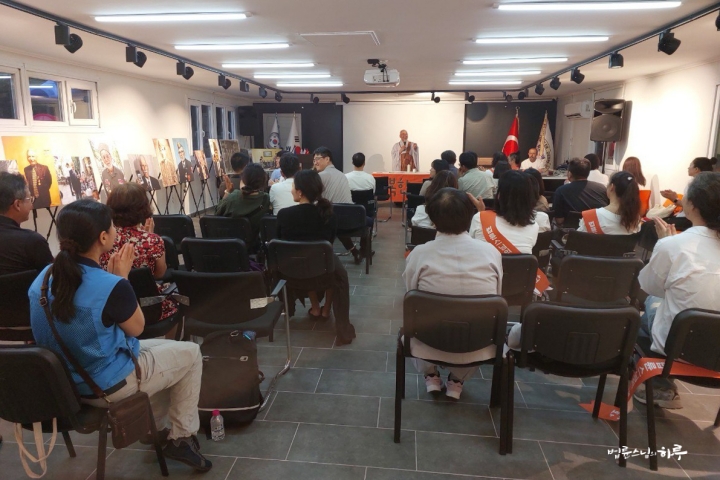
Sunim greeted everyone with a bright smile.
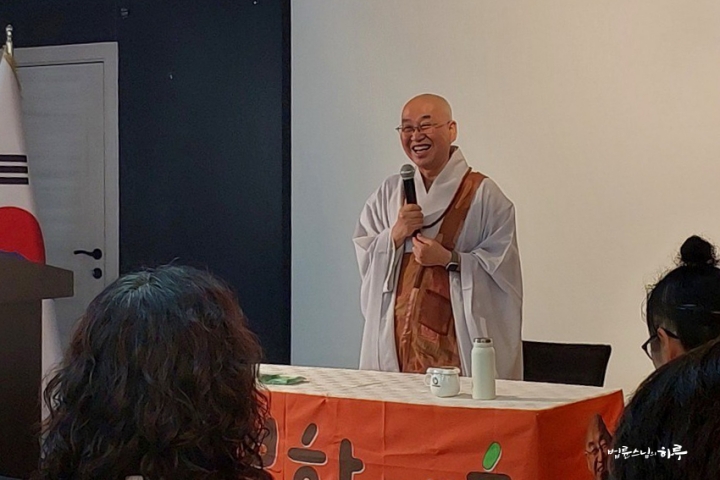
“This is my first lecture in Istanbul in 11 years. When I gave a lecture in 2014, it was held at a monastery, but today it’s much nicer to be at the Korean Community Center. Was the traffic heavy on your way here? I stayed at accommodation near Hagia Sophia, and it took me about an hour and a half to get here.”
Sunim then had conversations with four people who had submitted questions in advance. He also took two more questions from the audience on the spot. Over the course of two hours, six people asked Sunim about various life concerns. One of them sought Sunim’s advice about whether her attitude was appropriate – demanding apologies from her husband while finding it strange when her daughter demanded apologies from her.
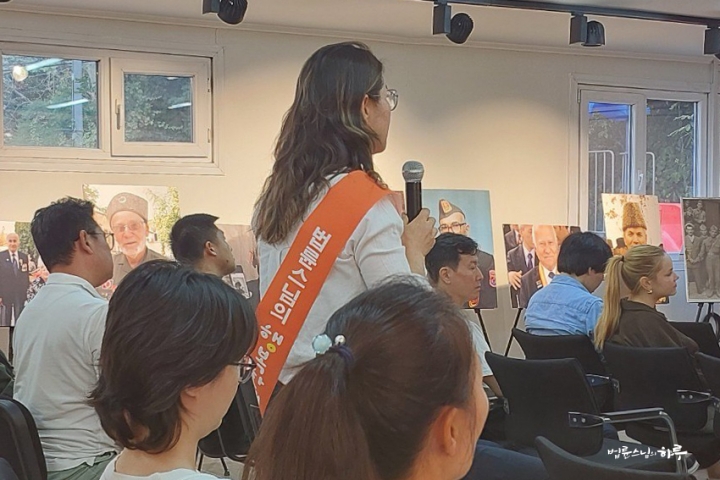
My Daughter Demands Apologies for Trivial Things – Is the Problem with Her or Me?
“Who gave birth to that daughter?”
“I did.”
“Who raised her?”
“I did.”
“If you gave birth to her and raised her, who do you think she takes after?”
“She takes after me a little, and I think she’s half and half between my husband and his family.”
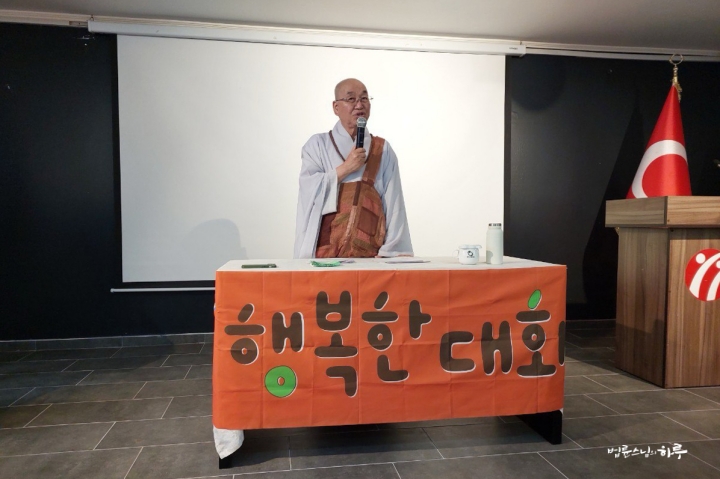
“So when she does well, it’s thanks to you, and when she doesn’t, it’s your husband’s fault? If you gave birth to her and raised her, she actually takes after you in everything. We often say, ‘As the child grows, they take after so-and-so,’ but that’s actually a funny thing to say. When you have the thought toward your husband, ‘Shouldn’t you apologize?’ your child absorbs that mindset completely, even without words. Between parent and child, the mind is transmitted directly. Mother and child are connected in the unconscious even without speaking. Children don’t just imitate their parents’ words and actions – they also absorb the emotions held in their hearts. So she’s showing this behavior by following your example. She didn’t fall from the sky, nor did she learn it elsewhere.
Just as you think to your husband, ‘Shouldn’t you apologize?’ your child thinks to you, ‘Shouldn’t Mom apologize?’ When your child demands an apology and you think, ‘What is there to apologize for?’ your husband thinks exactly the same way. Right now, you’re standing in the middle. From your husband’s perspective, the wife is the problem, and from your child’s perspective, the mother is the problem, but you’re in between both sides. Yet if you only see it as ‘My husband is the problem’ or ‘My child is the problem,’ that’s self-centered.
You need to understand your husband by observing your reactions to your child, and understand your child by observing your reactions to your husband. Understand your husband through your child, and understand your child through your husband. If you do this, you can reflect on your husband, thinking ‘I was being too sensitive,’ and stop nagging him. You can also understand that your child might feel hurt and apologize, saying, ‘Mom was wrong, I didn’t think about it.’ This way, you’ll naturally learn from being between both sides.”
“But I feel it’s unfair. If I shouldn’t demand apologies from my husband, and I should apologize to my daughter, then I’m the only one who has to endure everything.”
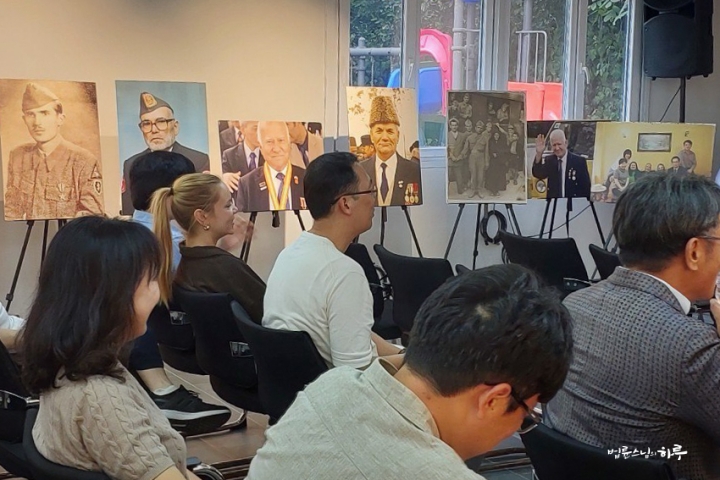
“When you put yourself at the center, you might think that way. You think, ‘If my husband doesn’t apologize, I shouldn’t apologize to my child either,’ or ‘If I apologize to my child, my husband should apologize to me too.’ But if you think carefully, you’re learning something from both perspectives. Rather than feeling wronged, you’re actually benefiting.
Your husband only knows his own position, and your child only knows her own position. But you can understand both the perpetrator’s and victim’s positions by observing both of them. Your husband is, so to speak, in the perpetrator’s position, and most perpetrators think, ‘What’s the problem?’ For example, there are people who were hurt by being scolded by their mothers when they were young. When they grow older and ask their mothers, ‘Why were you so harsh back then?’ the mothers say, ‘When did I ever do that? Everything I did was for your own good.’ Probably not even one in ten or one in a hundred parents would acknowledge, ‘I really wronged you when you were young.’ On the other hand, victims want apologies until the end.
This difference is related to how the brain works. When you click on a Venerable Pomnyun Sunim lecture on YouTube, similar videos line up next to it. After watching just a few, your screen becomes filled with Venerable Pomnyun Sunim videos, making it seem as if there’s no one else in the world but him. The recent claims by some conservatives that elections were rigged follow the same principle. Even people who didn’t believe it before, after watching a few related videos, have their minds filled with that idea. Similarly, the human brain has a tendency to automate when the same stimulus is repeated. This is called habit or disposition. When the same thing is repeated, the brain tries to process it efficiently using less energy by automating it. When we say ‘I did it unconsciously’ or ‘I did it without realizing,’ we’re referring to this automation system. When this automation progresses, we move unconsciously while having strong self-conviction. Even if you don’t believe something at first, if you hear the same thing repeatedly, you eventually mistake it for reality. So when conflict arises with your husband, the thought ‘My husband is wrong, I’m being wronged’ comes up first. Then the brain operates like YouTube’s algorithm, bringing up incidents from three days ago, ten years ago, even from when you were dating. Memories that hadn’t surfaced at all come flooding back, and eventually the conviction that ‘My husband is wrong and I’m right’ solidifies.
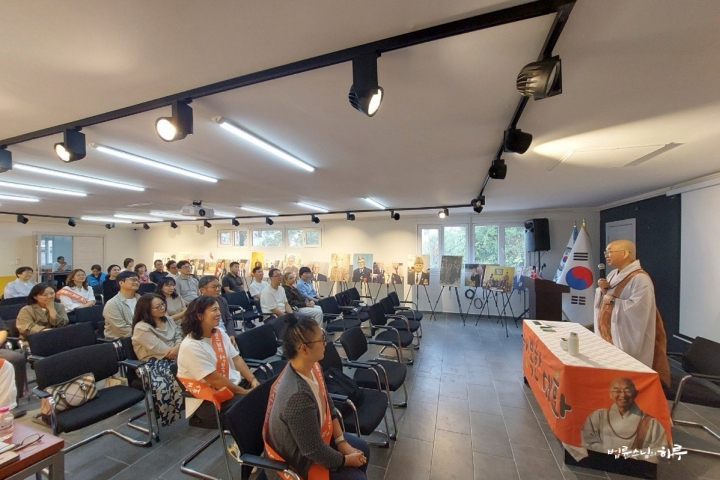
However, the perpetrator’s perspective is different. While they may feel a little sorry, they usually forget about it quickly. For example, if a couple has a fight in the morning, the wife keeps dwelling on it while doing housework, but the husband’s mind quickly fills with other thoughts about work and meetings with other people. It’s like watching different videos on YouTube, where the first video gets pushed aside. The wife has been watching the same video repeatedly all day, while the husband has been watching different videos. So when the husband comes home from work, the wife expects ‘Now he’ll apologize to me,’ but the husband has no such intention. Then the wife raises the issue, asking ‘How can you be like this?’ and the husband gets annoyed, saying ‘Isn’t that conversation over from this morning?’ Eventually, the wife reaches the conclusion that ‘He hurt me so much and takes no responsibility.’ This is how conflicts escalate. This is the common structure of conflicts.
This also happens between children and mothers. The mother says things casually like ‘You’re the older sister, so be patient,’ or ‘You get scolded because your younger sibling provokes you.’ But later in counseling, the younger sibling remembers ‘Mom always took my older sister’s side,’ while the older sister remembers ‘Mom always favored my younger sibling.’ What the parent said casually became a wound for the child. Later, when the child demands an apology, the mother dismisses it saying ‘What’s the big deal? I said it all for your own good.’ The mother has forgotten, but it remains as a victim mentality in the child.
Right now, you’re telling your husband about the harm he caused you, but your husband dismisses it saying ‘Why are you making such a big deal out of nothing?’ Then you feel wronged and bring it up again, and the conflict continues. You’re experiencing both the perpetrator’s and victim’s positions simultaneously. It’s not necessarily because the perpetrator is bad – in relationships, we naturally become both perpetrators and victims. There’s also something called secondary and tertiary harm. When someone with little awareness of being a perpetrator tries to explain themselves out of feeling wronged, it becomes another wound for the victim. These days, such cases are very serious. The perpetrator simply said something out of feeling wronged, but it sounds like an excuse and leads to secondary and tertiary harm. That’s why in cases like sexual harassment, people can’t even offer explanations. Because as soon as they open their mouths, it becomes secondary and tertiary harm.
The Korea-Japan relationship is the same. Prime Minister Abe once said, ‘How long do we have to keep apologizing? We won’t apologize anymore.’ Korean people are hurt by such attitudes. When we demand a sincere apology, the Japanese side responds with ‘We already apologized before, why do you keep bringing it up?’ That’s why the conflict doesn’t get resolved. But we can’t just blame Japan. Because our own thought system operates the same way. That’s why we need to study our minds. If we understand the principles of how the mind works, we can escape from such conflicts, but without knowing the principles, we endlessly insist on our own position.”
“Then what should I do?”
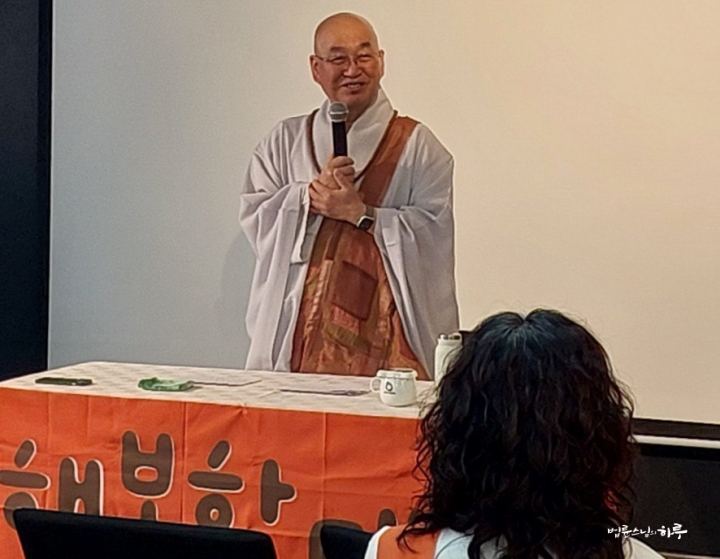
“Regarding your husband, think ‘This wasn’t a big deal to my husband. I was being a bit sensitive.’ Regarding your child, think ‘Even if it seems trivial to an adult, it can be a big deal to a child.’ You should ask your child in detail, and if the child was hurt, say ‘Mom was a bit thoughtless. I didn’t understand your feelings when I spoke, and that hurt you. I’m sorry.’ Regardless of whether the mother did right or wrong, the child has been hurt.”
“Then shouldn’t I ask my husband for an apology either?”
“You can ask for an apology. However, unlike historical issues like Korea-Japan relations which are difficult to let go, between spouses, there’s no need to keep pursuing it. You can raise the issue. If your husband admits he was wrong, that’s good. If he says ‘That’s all in the past, we already talked about it,’ then understand ‘In his mind, this is already over.’ There’s no need to bring it up two or three times.”
“Thank you. I understand well.”
Questions continued one after another.
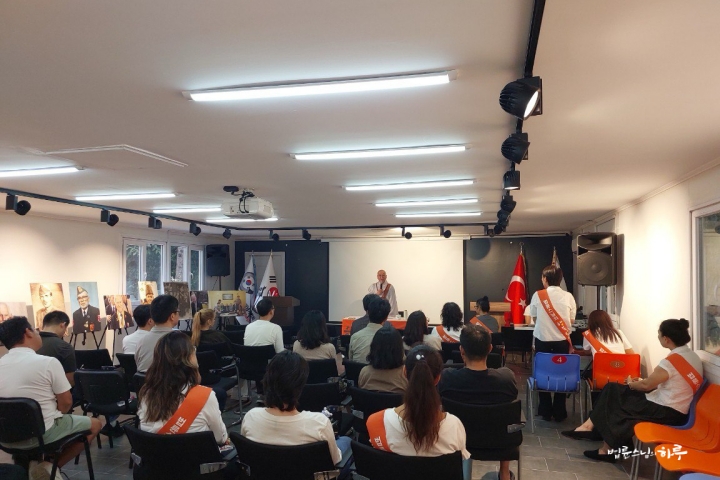
My husband passed away early, and after raising my children and sending them abroad to study, I feel alone. How should I live?
My devout Muslim husband forces religion on our children who have lost interest in religion. What should I do?
I want to make the best choices for my children, but I keep becoming indecisive and postponing decisions. Please tell me how to make wise choices.
My daughter is going through puberty. What should I do when she makes unreasonable demands?
I’m an expatriate in Istanbul. How can I relieve the pressure from my company to perform better than others?
Various life topics were honestly discussed, from family and faith to child education and workplace pressure. Sunim responded to each one, communicating with the audience. At 6:30 PM, the lecture ended with great applause.
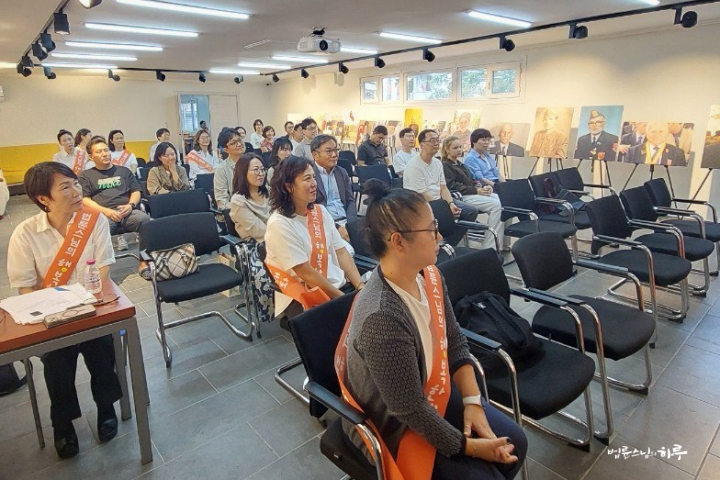
After the lecture, Sunim took a commemorative photo with the participants.
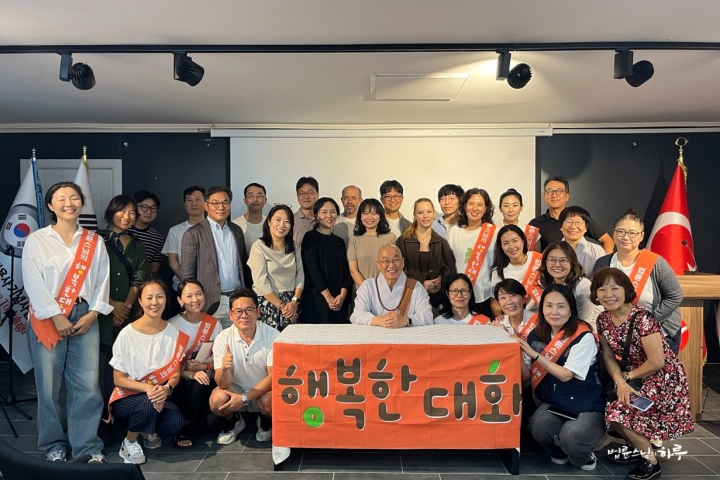
He also took a commemorative photo with the volunteers who prepared the lecture.
“Thank you all for your hard work.”
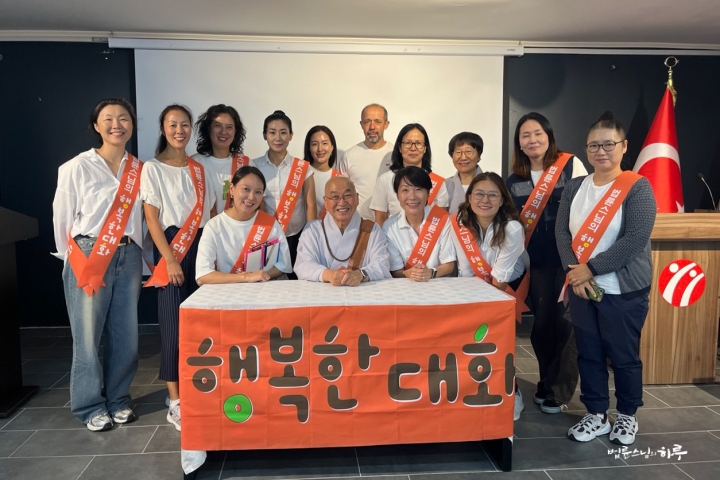
The volunteers shared their gratitude and pride while cleaning up. They then had a mindful sharing session with Dharma Teacher Myodeok.
“This Dharma Q&A was arranged after many twists and turns. I’m truly grateful to the volunteers who prepared the lecture with one heart.”
“I’m a 1.5 generation Turkish-Korean. I was disappointed that I couldn’t attend Venerable Pomnyun Sunim’s lecture 11 years ago, so it’s very meaningful to be able to participate this time. If given the opportunity, I definitely want to volunteer again next time.”
“I had an experience of being severely criticized when I asked a question at the lecture 11 years ago. My gratitude was so great then that I really wanted to participate this time too.”
“I was so happy to meet Venerable Pomnyun Sunim in person in Istanbul. I now have the aspiration to establish Jungto Society in Istanbul.”
Sunim was invited to dinner by Mr. Kim Young-hoon, former president of the Korean Association in Turkey, and they moved to a restaurant together. They had many conversations over the meal.
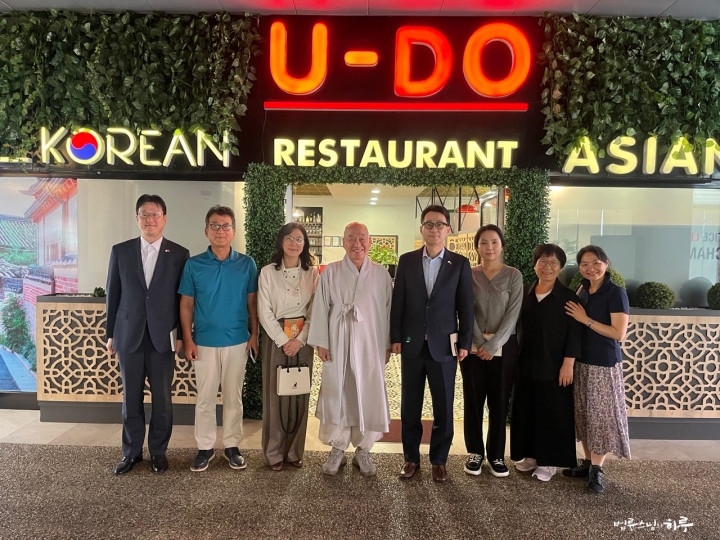
After finishing dinner, Sunim arrived at his accommodation at 9:30 PM and concluded the day’s activities.
Tomorrow morning, he will tour the Topkapi Palace Museum in downtown Istanbul, have lunch with the Consul General of the Consulate General of the Republic of Korea in Istanbul, and in the afternoon, depart from Istanbul Airport to Bangkok Airport for a Southeast Asian field trip.





